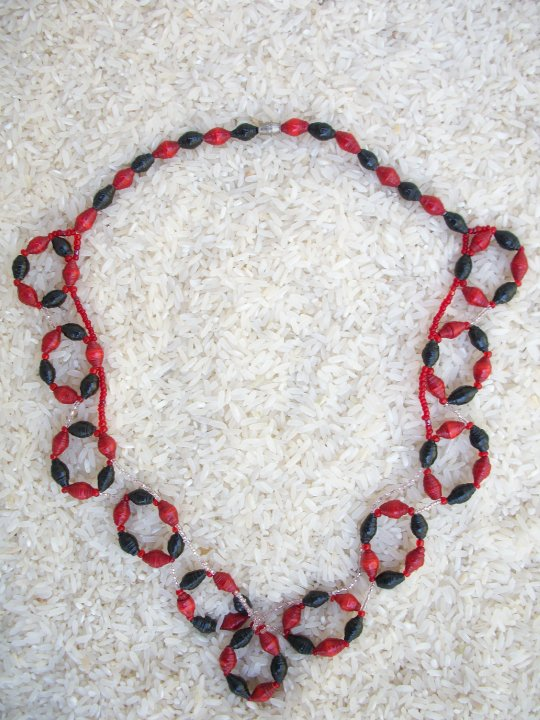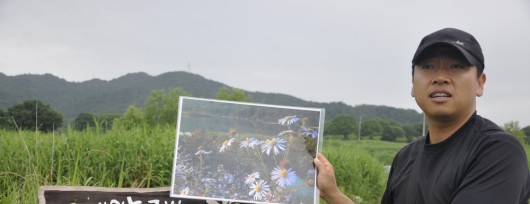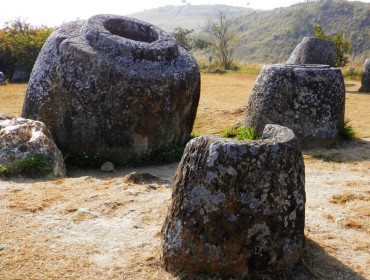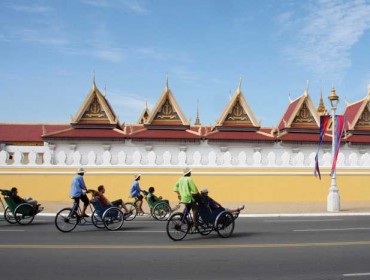A Korean Vacation: Volunteering in the Philippines 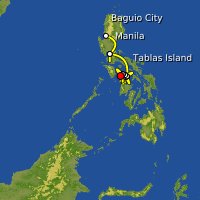
Words and Pics by Hannah Stuart-Leach
My first morning on Tablas, a little-known island in the Philippines, I woke to the sun scorching through the window and cockerels screeching up a storm all around. It was five am. But it wasn’t the cockerels that got me; I’d been treated to an early start by them in Manila. It was the blaring beats behind the Wondergirls’ hit “Nobody”, accompanied by their uniform squawking: “I want nobody, nobody but you….”
To my disappointment, it seemed K-Pop had spread as far as the unassuming village of Sugod. Permanently looking like a scene straight from Lost, with dense forest covered mountains on one side, and rugged beach on the other, this was the last place I thought I’d be so swiftly reacquainted with the Korean wave.
Thinking there must be a celebration underway; I ducked from under my scraggy mosquito net and stepped outside to see. Through squinting eyes, all that awaited me was a vision of Felix, father of the family I was staying with, tending to snuffling pigs and hoards of cats and dogs in the yard. I wandered down the dusty road to find the rest of the village also just going about its morning routine, but to the sounds of Korea’s manufactured pop. Turned out that one family, in possession of a CD player, had been kind enough to turn the volume up for everyone’s pleasure.
I’d come to the Philippines having finished my contract teaching at one of Gangnam’s extortionately priced hagwons. Although I’d been sad to leave my class of Burberry-clad tots, I was ready for a change of scenery, and more than that, a change of pace. Fun as it had been, I was worn out from teaching in the city, and had been looking forward to idle afternoons on beaches, eating sugary mangoes. But knowing the Philippines was a place where many struggled to get an education at all, let alone be put through private academies, I was keen on doing some volunteering too.
Although only a short flight south of Korea, the immediate contrast between the two countries was shocking. In Manila, where I’d spent the first few days, the raw struggle to survive was displayed with alarming regularity. In the oppressive midday heat, I’d passed endless slums where semi-naked children roamed the streets, collecting plastic bottles to sell. Outside some of the tin shack homes lay tiny white coffins, waiting for final goodbyes. It was life stripped to its bitter core. 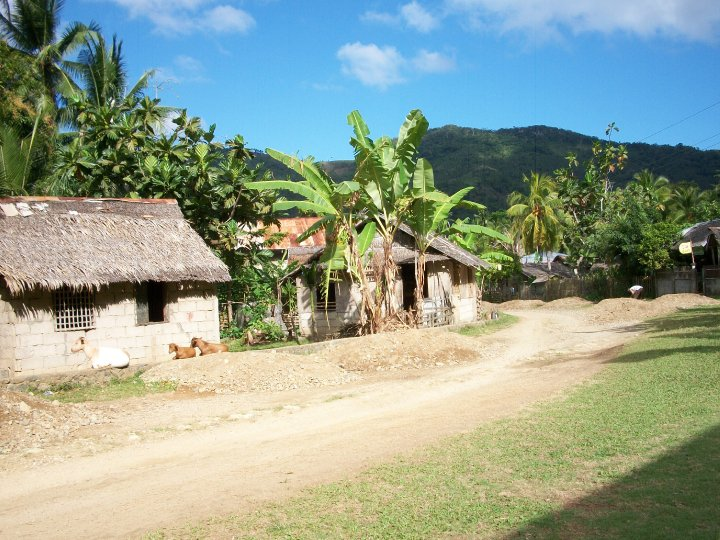
Sugod, in fact, came as a relief after the capital. The tropical, and instantly stunning scenery, almost provided a diversion from the existent poverty. Although some could afford brick houses, most made do with bamboo or wood homes, which covered the land from the dirt road to the rugged shore. But on the surface, the simplicity of life there, and the carefree manner of the people, held a romanticism that the grimy sprawl of Manila could not.
Although teaching might have been the obvious choice, I’d chosen to volunteer with a local craft group, the Payawpao Orchids, instead. Initially they seemed shy, but the five women who made up the group welcomed me with almost devotion, eager to demonstrate how they made their colorful paper accessories. We met in the charity-owned dorm after lunch every day, when their morning chores were done, and sat for hours quietly rolling paper beads and coming up with new craft ideas.
With unemployment hovering at around 85% in the village, many men leave to find work. Initiatives like the craft shop exist to help women, often mothers and homemakers, earn extra income in a flexible way.
After being coated in varnish several times, the beads would be strung up to dry, before imaginatively being fashioned into a necklace, bag, or some other pretty adornment. I was amazed by what the women came up with, and often wondered why they needed me there. With talent and creativity flowing easily amongst them, I concluded that my real worth was in reinforcing the value of their shop. Knowing that someone had traveled to their village to help them seemed to motivate them to continue and expand.
With mornings free, I went to help paint science lessons on the walls of the nearby school he taught at. But instead of boarding a heaving bus for 30 minutes, as I had in Seoul to get to work, I was treated to 15 windswept minutes on a motorbike. The narrow, dusty road up the mountain, offered a spectacular view of the sheer drop into the clear, sun-tinted water below. It was an addictive start to the day.
One morning on my way back, I bumped into Erna, one of the women from the craft group, who invited me into her home, insisting I eat mounds of fresh watermelon, washed down with coconut milk. No matter what predicament they found themselves in, the Filipinos I met were always cheerful and endlessly hospitable. She told me the money from her first jewelry sale had gone to purchase the chickens that clucked their way underneath the stilts of her wooden house – rebuilt since a devastating typhoon had destroyed her previous one. She beamed with pride as she told me this, and the craft shop suddenly became a whole lot more meaningful.
The daily routine in Sugod was simple, often repetitive, but I grew to love it. I got used to not showering, but chucking a bucket of cold water over myself. I was happy there was no junk food to speak of, nothing extraneous to spend your money on. I came to appreciate the food I was given, knowing the effort that had gone into fishing, slaughtering or growing it. One day I came home for lunch to find a grinning Felix, gesturing towards the kitchen floor: “Look, that’s your dinner over there!” And sure enough, that evening we were treated to some unusual soup, tasting slightly reminiscent of bile, made from the cow’s head he’d bought that morning – brain, tongue and all.
If there was any spare time during the day, I went and found myself a peaceful shaded spot by the sea. It was never long before someone emerged from the trees behind to keep me company though. Having grown up in such close proximity to each other, alone time wasn’t really desirable, family and friendships were everything.
Most evenings everyone sat around talking, sometimes over some lethal Tanduay rum. We each took a shot, followed by a swig of water, and then passed it on to the next person. Sometimes, everyone would club together and hire a videoke machine, usually for a birthday. Renditions of Lady Gaga, K-Pop and various soppy ballads were then sung late into the night. Frank Sinatra’s “My Way” was off limits though. People thought so highly of the song, that there’d been tales of shootings after people had failed to do it justice.
On my last day in Sugod, Paul, another volunteer, took me up into the mountain. We walked past the local school – where class sizes sometimes reached 70 – making my modest class of 12 in Korea look ridiculous. Then we passed the field where one man reared cocks for fighting. They were a popular form of entertainment for locals, and many families owned one. 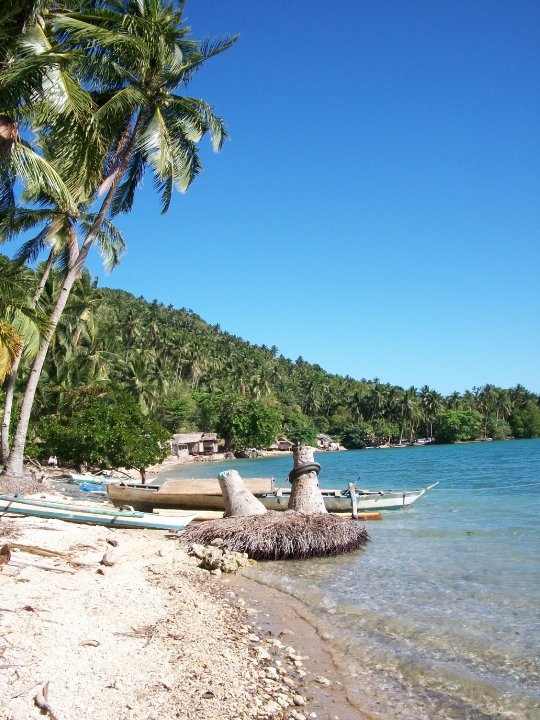
As we walked further, the path trailed off and the forest became less hospitable. The setting sun cast darkness over the small wooden homes we began to pass, and dogs howled eerily in the distance. We walked past several families, where frail children, some sick, or so exhausted from their days work, lay motionless on the grass. Any romantic vision I had of life in the village was instantly rectified. And this was only the beginning. Paul told me that many others lived right up in the mountain and beyond, so if they were lucky enough to attend school, they would walk miles to get there. For me, staying in the heart of the village, the simple rural routine had been a welcome change. But for many, especially those in the farthest reaches of the village, this was how their entire lives were likely to be played out. It was no novelty for them.
Eventually finding our way back to the main road, I struggled to process everything. I’d only been away for a few weeks, but my life in Korea seemed unreal now. Truly humbled by the whole experience, I thought about how lucky I was to be paid well, well enough to travel, for a job based solely on the language I was born to speak. Thankful to have experienced the good grace of the people of Sugod, I knew at the very least, I would never again complain when I heard the Wondergirls.
============================================================
 This is Hanna Stuart-Leach’s first contribution to 3WM.
This is Hanna Stuart-Leach’s first contribution to 3WM.
Born in the south of England, she has spent the last couple of years teaching in Korea and exploring the beautiful countries of Asia. She loves writing, anything old or by the sea, and the infinite wisdom of Korean stationery.
Email: h.stuart-leach@talk21.com.




